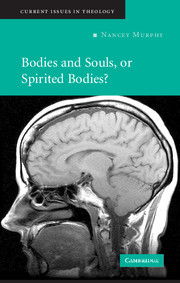Book contents
- Frontmatter
- Contents
- List of figures
- Preface
- 1 Do Christians need souls? Theological and biblical perspectives on human nature
- 2 What does science say about human nature? Physics, evolutionary biology, and neuroscience
- 3 Did my neurons make me do it? Reductionism, morality, and the problem of free will
- 4 What are the philosophical challenges to physicalism? Human distinctiveness, divine action, and personal identity
- Index
1 - Do Christians need souls? Theological and biblical perspectives on human nature
Published online by Cambridge University Press: 05 June 2012
- Frontmatter
- Contents
- List of figures
- Preface
- 1 Do Christians need souls? Theological and biblical perspectives on human nature
- 2 What does science say about human nature? Physics, evolutionary biology, and neuroscience
- 3 Did my neurons make me do it? Reductionism, morality, and the problem of free will
- 4 What are the philosophical challenges to physicalism? Human distinctiveness, divine action, and personal identity
- Index
Summary
Prospect and problems
One thing we have in common with the first Christians is this: we have available to us a wealth of conflicting ideas about what a human being, most basically, is. It is important to be aware of this fact since whatever we believe on this subject will influence how we think about a great number of other issues, for example: What happens to us after we die? Is an embryo a person? Ordinarily we do not discuss our theories of human nature, so these disagreements are kept largely below the surface of our debates. Here is an example: when Dolly the sheep was cloned I received calls from media people looking for a Christian reaction. One reporter seemed frustrated that I had no strong condemnation of the idea of cloning humans. After his repeated attempts to provoke me to express some sort of horror at the prospect, light dawned for me. I asked him, “Do you read a lot of science fiction?” “Well, some.” “Are you imagining that if we try to clone a human being we'll clone a body but it won't have a soul? It will be like the zombies in science fiction?” “Yes, something like that.” “Well,” I said, “don't worry. None of us has a soul and we all get along perfectly well!”
Because we seldom discuss our theories of human nature it is difficult to know what others think. I have had to resort to informal polling whenever I get the chance.
- Type
- Chapter
- Information
- Bodies and Souls, or Spirited Bodies? , pp. 1 - 38Publisher: Cambridge University PressPrint publication year: 2006

